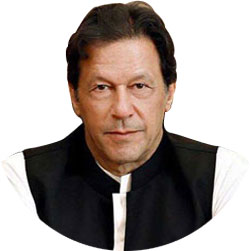Prime Minister Imran Khan has reiterated that Pakistan will maintain its neutrality and not become part of any camp, turning down speculations that Islamabad was inclined towards Beijing.
“The strategic direction of my government is very clear. We want to maintain relations with all and [we] will not become a part of any camp,” Imran Khan said during an interaction with former ambassadors and representatives of think tanks in the Federal Capital on Sunday.
The prime minister said his recent visit to China and bilateral meetings with the country’s leadership had added further strength to the time-tested ties and would accelerate the pace of work on the ongoing projects of the China-Pakistan Economic Corridor. He said that his recent visit to China was “very relevant with regard to the fast-changing global political map.”
The Chinese leadership appreciated Pakistan’s measures taken to overcome the Covid-19 pandemic, and the positive economic indicators, he said, adding they reaffirmed economic support to Pakistan through specific projects.
The prime minister opined that his visit further added strength to the ties between the two countries, adding that he held the meeting with President Xi Jinping after years.
About Afghanistan, the prime minister said the international community had a consensus over this issue. Europe and all the neighbouring states of Afghanistan agreed to avoid humanitarian crises there and stressed upon de-freezing of Afghanistan’s assets, he said.
“The US also understood and realised the situation. All had a consensus that steps should be taken so that Afghanistan should not be descended into chaos,” the premier said.
Responding to a query, the prime minister said that after the 18th amendment, several issues had surfaced with regard to decision making, as he cited the difference in prices of wheat in Sindh and other provinces.
Referring to the functioning of the Chinese government, the prime minister said when a decision was taken there, it was implemented across the board, but in Pakistan, there was a lack of such synergy among the federal and provincial governments.
During the last three and half years, the government had navigated from “the minefield” of economic challenges, he said, adding that due to the government’s prudent policies, the country was witnessing growth rate, record tax collections, revenue generation, and remittances which indicated that the country’s economy had been moving in the right direction.
To another question, the prime minister opined that unless you had a two-thirds majority in the Parliament, you could not enact legislation to bring in various reforms in the society, stressing that there was a requirement for huge reforms.
These pieces of legislation, sometimes, are stuck in the National Assembly or in the Senate, he maintained.
He said in China, they had meritocracy and rule of law. About 400 ministerial-level people had been held accountable over corruption charges which had increased the popularity of President Xi, he said.
The prime minister said the global pandemic had devastated the world. “Different countries of the world including Italy, Spain, and the UK opted for complete lockdowns, but I went against such precedent for which I was bitterly criticised by my political opponents.”
Defending his decision of smart lockdowns, the prime minister said in the US, Germany, and France, people had been on the roads against lockdowns.
“We are ahead of everyone as we have not only saved our economy but also our lives,” he said, adding in India, the growth rate had been in the minus due to a blanket lockdown.
To a query, he replied that he had met Russian President Putin in Bishkek. After his tweet about the negative use of freedom of speech to hurt Muslims’ feelings, they held a telephonic conversation in which the Russian president conveyed that there was no Islamophobia in Russia and a central mosque in Moscow was fully functional.










